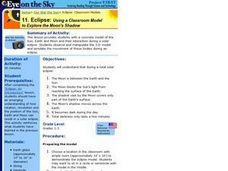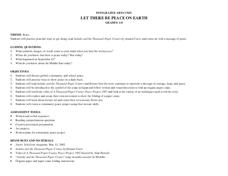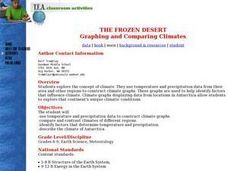Colorado State University
What Is a "Convection Cell"?
Round and round in circles it goes! A hands-on activity has learners recreate a model of a convection cell. They watch as the difference in density of their materials creates a current.
NOAA
What's the Difference?
Due to the isolation of seamounts, their biodiversity offers a great deal of information on the development of biological and physical processes. Pupils use simple cluster analysis to rate the similarity and differences in biological...
Statistics Education Web
Are Female Hurricanes Deadlier than Male Hurricanes?
The battle of the sexes? Scholars first examine data on hurricane-related deaths and create graphical displays. They then use the data and displays to consider whether hurricanes with female names result in more deaths than hurricanes...
Polar Trec
Beacon Valley Weather
In Beacon Valley, katabatic winds regularly knock fit adults to the ground. The lesson compares the actual temperatures to the wind chill after factoring in katabatic winds in Beacon Valley. Scholars learn to calculate wind chill and...
Curated OER
Moon Mining
Go on a moon mining expedition from the safety of your classroom with this space exploration simulation. Using simple models of the moon's surface prepared ahead of time by the teacher, young scientists are challenged with locating and...
NOAA
A Matter of Density
Larvae transportation on the New England seamounts is based on the density of the water. Scholars calculate density and graph salinity versus temperature to better understand the distribution of organisms in a water column....
United Nations
Compost Monitor Training
What should go in the trash, and what can be composted? Guide your young conservationists through the process of composing their trash with a instructional activity about the different ways we can dispose of garbage. Using a trash bag...
Curated OER
The Finer Things in Life
Momoyama and Edo are periods in Japanese history that can be defined culturally and artistically. Learners explore and discuss how the samurai used sword guards and grip enhancers. Pupils read the story "The Inch-High Samurai," examine...
Curated OER
Eclipse: Using a Classroom Model to Explore the Moon's Shadow
Students manipulate and observe a 3-D model which simulates the activity of the Sun, Earth and Moon during a solar eclipse.
Curated OER
Trouble in the Troposphere
Students Use data sets from MY NASA DATA to produce graphs comparing monthly and yearly ozone averages of several U.S. cities. They analyze and evaluate the data and predict trends based on the data. In addition, they discuss and...
Curated OER
Make a Shadow Clock
Pupils make shadow clocks. In this earth science lesson, students follow the provided steps to make shadow clocks out of the provided pattern and tagboard. A game, a song, a craft, and a recipe are all included with the lesson.
Curated OER
What Do We Know About Africa?
First graders explore Africa, its geography and climate. After completing a KWL chart, 1st graders locate Africa on a globe and discuss how its location on the earth affects its climate. Using the Internet and a given fact sheet,...
Curated OER
Sundials: Observing and Using Shadows
Young scholars build sundials and observe changes in shadows over the course of one or more days. They identify patterns in the shadows and discuss how shadows may be used to tell time.
Curated OER
Crater Lakes and the Volcanoes of the Cascade Mountains
Students study volcanoes. For this Earth science lesson plan, students read, discuss and take notes on the volcanoes of the Cascade Mountains. This lesson also includes an art project.
Curated OER
Mississippi’s Contribution to Space Exploration
Eighth graders engage in a class discussion while going through a PowerPoint on Mississippi's contribution to space exploration. In this Space science lesson plan, the students will also participate in Brain Pop quizzes where they will...
Curated OER
Powering a Green Earth
Students compare and contrast renewable and nonrenewable energy. In this environmental science lesson, students discuss the importance of going green. They identify the different components in a power grid system.
Curated OER
You Can Die Here
Students examine Death Valley including the amount of precipitation and winds that it gets. In this climate based lesson plan students explain the reasons for the amount of precipitation and windward patterns in Death Valley.
Curated OER
TE Activity: Nidy-Gridy
Learners make a grid and coordinate system map of their classroom as they investigate why it is important to have a common map making system. They look at how landmarks are used for navigating an area.
Curated OER
Let There Be Peace On Earth
Students discuss the concept of peace and brainstorm ways to show peace. They read "Sadako & the Thousand paper Cranes" and discuss the theme of the story. After watching a video of "A Thousand Paper Cranes peace Project 1977,"...
Curated OER
Get into the Flow with an Interactive Volcano
Students research the structural elements of a volcano. They make a PowerPoint slide that contains five facts which will be added to a whole class slideshow. They add an interactive table of contents using action buttons.
Curated OER
The Frozen Desert: Graphing and Comparing Climates
Students explore the concept of climate. They use temperature and precipitation data from their area and other regions to construct climate graphs. These graphs are used to help identify factors that influence climate.
Curated OER
Rocks on Parade!
Third graders describe and classify rock samples. In this rock lesson, 3rd graders make inferences about rock samples by observing and measuring them. This lesson contains 5 different stations for the students to go to.
Curated OER
Volcanoes
In this science worksheet, students use basic scientific concepts to complete the series of puzzles that are intended to acquire and review vocabulary about volcanoes.
Curated OER
Cleaning Water: How Filters Work
Students construct their own water filter to obtain clean water. In this filtration lesson, students produce tainted water in order to properly filter it with filtration devices made in class.























